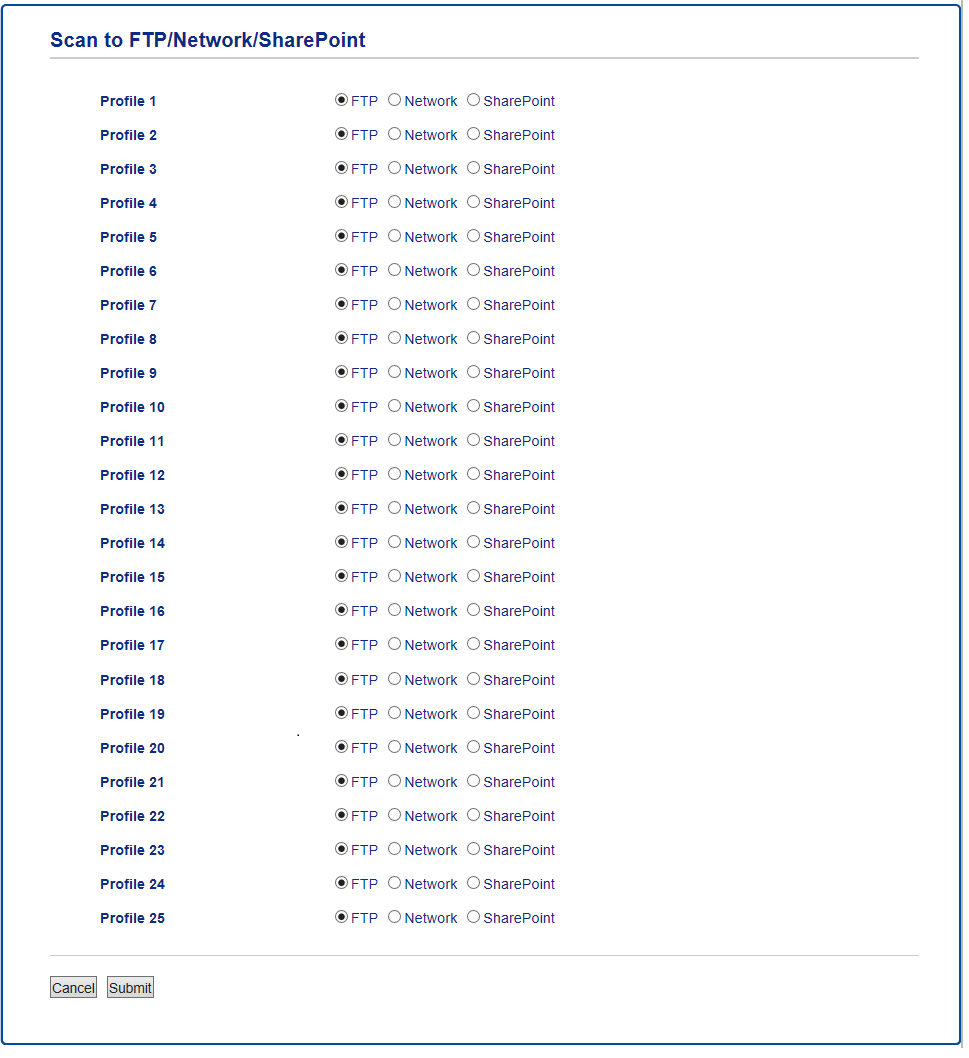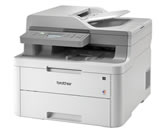DCP-L3551CDW
FAQs & Troubleshooting |
Set up a Scan to FTP Profile
Set up a Scan to FTP Profile to scan and upload the scanned data directly to an FTP location.
We recommend Microsoft® Internet Explorer® 11/Microsoft Edge for Windows® and Safari 10/11 for Mac. Make sure that JavaScript and Cookies are always enabled in whichever browser you use.
- Start your web browser.
Type "https://machine's IP address" in your browser's address bar (where "machine's IP address" is the IP address of the machine or the print server name). For example: https://192.168.1.2
If the machine prompts you for a password, type it, and then click
 .
. - Click the Scan tab.
- Click the Scan to FTP/Network/SharePoint menu in the left navigation bar.
- Select the FTP option, and then click Submit.

- Click the Scan to FTP/Network/SharePoint Profile menu in the left navigation bar.
- Select the profile you want to set up or change.
- In the Profile Name field, type a name for this server profile (up to 15 alphanumeric characters). The machine will display this name on the LCD.
- In the Host Address field, type the Host Address (for example: ftp.example.com; up to 64 characters) or the IP address (for example: 192.23.56.189).
- Change the Port Number setting used to access the FTP server. The default for this setting is port 21. In most cases this setting does not need to be changed.
- In the Username field, type a user name (up to 32 characters) that has permission to write data to the FTP server.
- In the Password field, type the password (up to 32 characters) associated with the user name you entered in the Username field. Type the password again in the Retype password field.
- In the Store Directory field, type the path to the folder on the FTP server where you want to send your scanned data. Do not type a slash mark at the beginning of the path (see example).

- Click the File Name drop-down list, and then select a file name prefix from the preset names provided, or from user-defined names. The file name used for the scanned document will be the file name prefix you select, followed by the last six digits of the flatbed/ADF scanner counter and the file extension (for example: "Estimate_098765.pdf").
- Click the Quality drop-down list, and then select a quality setting. If you choose the User Select option, the machine will prompt users to select a setting each time they use the scan profile.
- Click the File Type drop-down list, and then select the file type you want to use for the scanned document. If you choose the User Select option, the machine will prompt users to select a setting each time they use the scan profile.
- Click the Document Size drop-down list, and then select your document size from the list. This is necessary to make sure the scanned file is the correct size.
- Click the File Size drop-down list, and then select your file size from the list.
- Click the Remove Background Color drop-down list, and then select the level from the list. You can use this feature to remove the background colour of documents to make the scanned data more legible.
- Set the Passive Mode option to off or on depending on your FTP server and network firewall configuration. The default setting is on. In most cases this setting does not need to be changed.
- Click Submit.

Using the following characters: ?, /, \, ", :, <, >, | or * may cause a sending error.
Content Feedback
To help us improve our support, please provide your feedback below.
